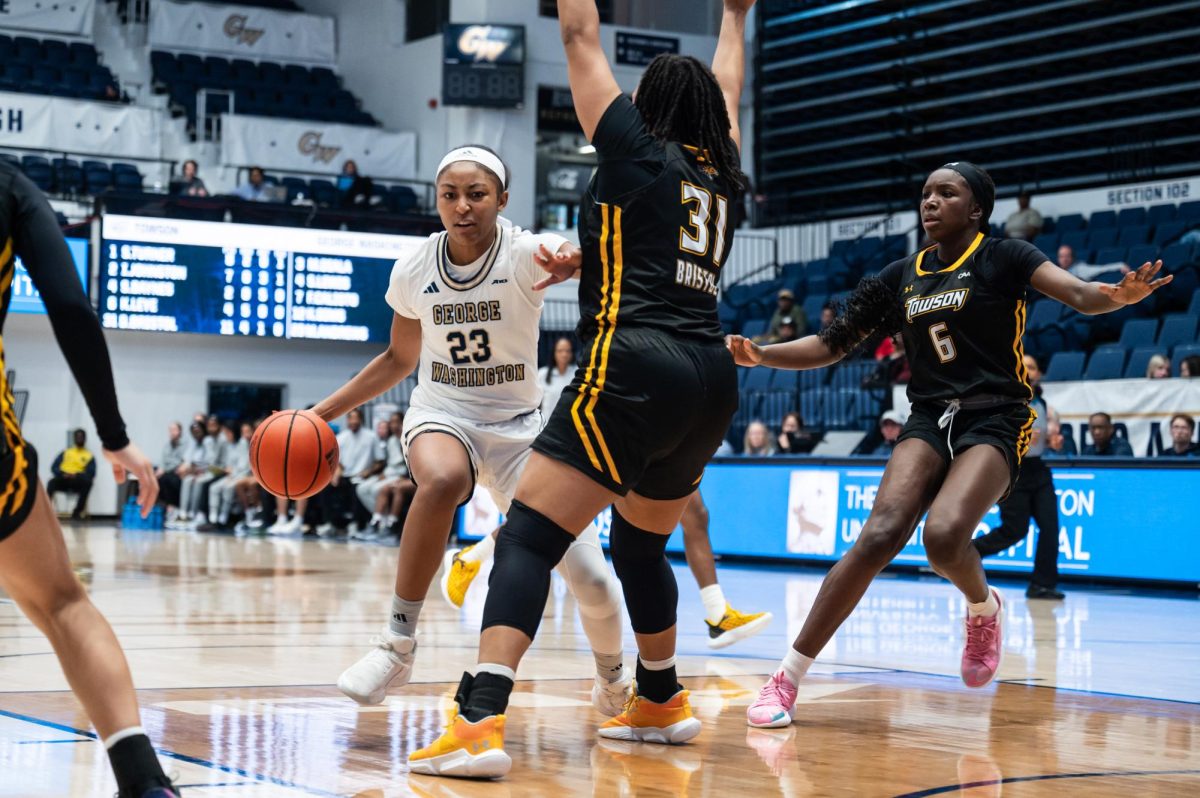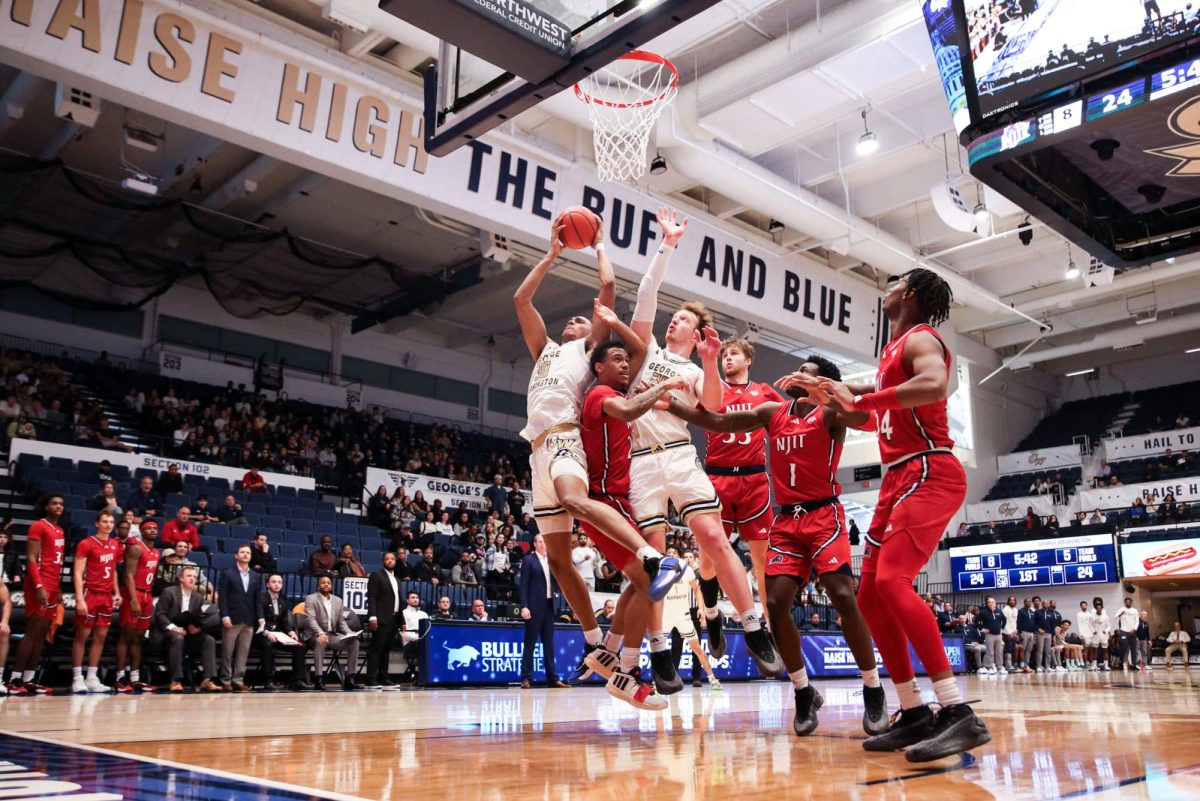When Shaunte’ Fremin was hired as GW’s head softball coach in August, players said they were optimistic. They lost 36 of 39 games in their first season as a varsity team last year and their head coach left to take another job. But Fremin, with an impressive resume as a player at Louisiana State University and as an assistant coach at the University of Georgia, brought hope.
“When you first meet her, she’s a good talker,” said one player, speaking on the condition of anonymity. “She knows softball. She knows the game … so no one thought this was going to be terrible.”
But according to allegations made by several players this past week, what developed over the next six months amounts to physical and mental abuse as well as possible NCAA violations.
Fremin flatly denied the allegations Tuesday afternoon, and none of them have been proven or affirmed by the University, which is still investigating the matter. When contacted by The Hatchet on Tuesday night to respond to the multitude of specific charges made, Fremin said she had been advised by her attorney not to comment further.
In its investigation, The Hatchet conducted interviews with five players, many of which shared the same stories, and assistant coach Trena Peel. Every current player and one former player said the allegations were credible, except for one current player who could not be reached for comment. Because Fremin is still their coach, players and parents interviewed said they were afraid to have their names used in The Hatchet’s report.
When outfielder Ashley Horner suffered a concussion during a game Saturday, players said Fremin told the freshman how to hide the injury.
“She told Ashley how to beat the concussion test that the doctor was going to give her if she went to the hospital so she could play,” one player said. “She would have us lie to trainers and doctors to have us cleared to play. Katie Harrigan had a concussion in the fall. She said she saw spots, (and Fremin said), ‘Don’t tell (team trainer Kent Hulnick) that.'”
Hulnick would not comment, but other players told similar stories about their injuries and Fremin’s disregard for them.
“She questions my commitment … She just doesn’t believe me,” one player said. “How could you not believe it when you have medical evidence? Our girls – it’s apparent that there’s something wrong … They’re killing themselves.”
Peel agreed with players’ characterization of Fremin’s relationship with trainers and doctors.
“I’ve always been concerned for their health and well being, but as an assistant, my input only goes so far,” Peel said. “I didn’t always agree with everything that happened, but I didn’t have the authority to override it … Shaunte’ always had the upper hand in the decision making.”
Players allege that playing through injuries wasn’t the only thing Fremin pressured them about. Four of the players interviewed as well as Peel said Fremin led the team in Christian prayers before games and that the coach once showed them a video about the value of Christianity in sports.
“Basically, the point of the video was that everyone was saying how much Christianity unifies the team and how great it is that everyone is Christian on the team,” one of the players said. “The last question was what can you do for the people who aren’t Christians, and they were like, ‘Well, you can just hope that they will be saved.'”
She continued, “At the end, she’s asking us all to comment on this, and the whole time we know that we have Jewish people on the team, so we tried to turn it around and be like, ‘Well, you just have to be accepting, accepting, accepting.’ And she just kept going off about how they had Bible study at LSU.”
Because they felt threatened and intimidated by Fremin, players said they did not report any of Fremin’s actions to University officials, nor did they report the seriousness of some of their injuries to Hulnick.
“Kent has done everything he could, but he has been limited in what he can do because as far as the injuries go, we have been intimidated not to tell anyone exactly what’s going on,” one player said. “We don’t go to him with our injuries until they’re to the point where we can’t go any further.”
Another player agreed, adding, “(Fremin) kept telling us that the injured are looked on as weak. And she would ask us, ‘What are the injured looked on as?’ And we’d have to be like, ‘Weak.'”
For a long time, players said, Fremin was also able to manipulate them by pitting them against each other. One player told a story about how she missed a meeting with a recruit to have fluid drained from her knee and how her team turned against her for it. The next morning, the player said her team did exercises as punishment for her missing the meeting.
“I was on my crutches watching them do everything and all (the coaches are) saying is, ‘You can’t fight the system. You can’t challenge coach Fremin. Coach Fremin will always be right,'” the player said. “They were told to have a meeting with me after we finished, and they all came to me and had a meeting and I was like, ‘There comes a point in time when your health comes first, and I made that decision. I did everything in my power to make the phone calls I needed so they weren’t expecting me.’ And they came and attacked me, believing everything that coach Fremin told them. Why wouldn’t you believe it? Why would a woman lie and manipulate situations? So of course we would believe it.”
One student who quit the team in the fall said players were discouraged from reporting their concerns to Senior Associate Athletic Director Mary Jo Warner and Director of Athletics Jack Kvancz.
“When you’re playing for someone like that and she keeps on saying, ‘If you go to Mary Jo, she backs me,’ it’s just intimidation,” the student said, also speaking on the condition of anonymity. “If someone went to (Kvancz), she would probably find out, and you don’t want to suffer the wrath of Shaunte’.”
Peel said she did not go to administrators because that was the parents’ role, but one mother said Fremin’s intimidation kept parents silent as well.
“I became aware unfortunately very early on, and although I did want to go to the administration, my daughter didn’t want me to because she thought that this coach would take it out on her,” she said. “I was hoping it would subside after the fall season, but it only got worse.”
The players also said Fremin made it clear that parents were not going to be a part of the program.
“Mary Jo will call Coach Fremin into her office and tell her that a parent has called to complain,” one player said. “Coach Fremin comes and tells us, ‘First of all, it’s disrespectful. Tell your parents not to call’… (And she says) that the administration laughs at it.”
While players said they did not mind the punishment exercises as much, the possibility of having their scholarships taken away was a serious threat for them.
“(Fremin) picked a certain player, one player who was having a bad day in practice, stated her exact scholarship amount in front of everyone and said, ‘That was (former coach) Leslie Moore who gave you that, not Fremin. I won’t make the same mistake again,'” one player recounted.
Peel declined to comment specifically on Fremin’s tactics, saying only, “She coached to win. That’s her philosophy. The players’ well-being was considered, but she coached to win. Some things may have gotten out of hand, but I understand her side too.”
That philosophy caused some players to quit the team, including the former player whom The Hatchet interviewed.
“(Fremin) said, ‘Every day shouldn’t be a good day. You should only have one happy day out of the month.’ And when I heard that, that was just ludicrous … I’m not saying this should be a cake walk, but for me to have one happy day out of the month? You’ve got to be kidding me,” the former player said.
Until a change is made, players said, softball is simply not fun anymore.
“When we won one game and lost one game Saturday, I couldn’t tell the difference,” one player said. “I’m used to winning games and being like, ‘Yeah, we won.’ That was my first college win, and I couldn’t tell the difference. I didn’t feel like we won anything. I wasn’t happy.”
-Jeff Nelson contributed to this report.






